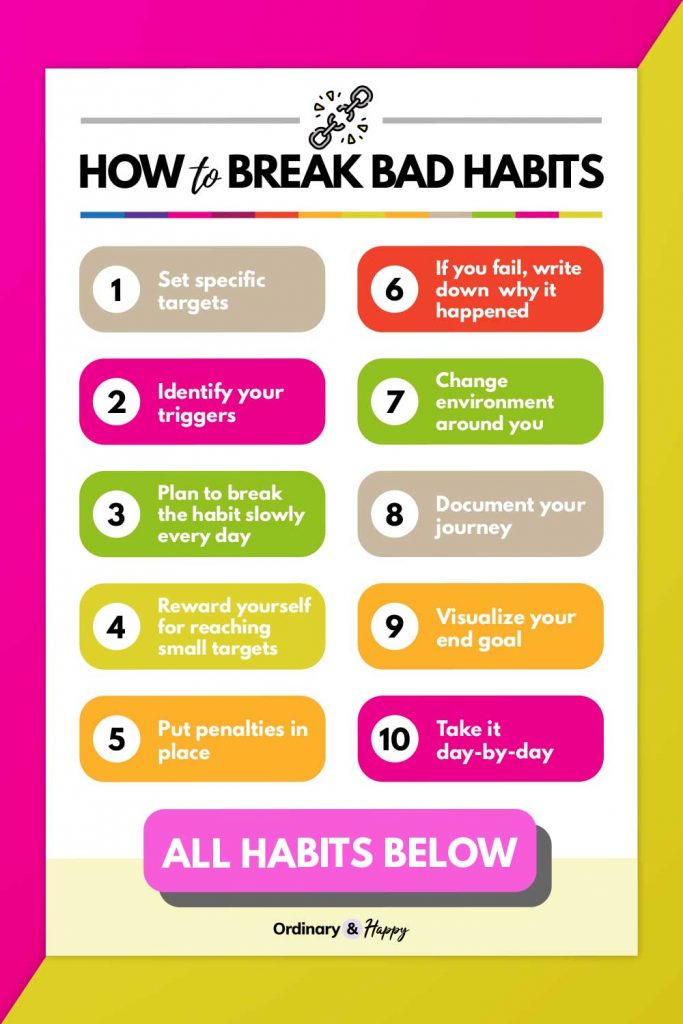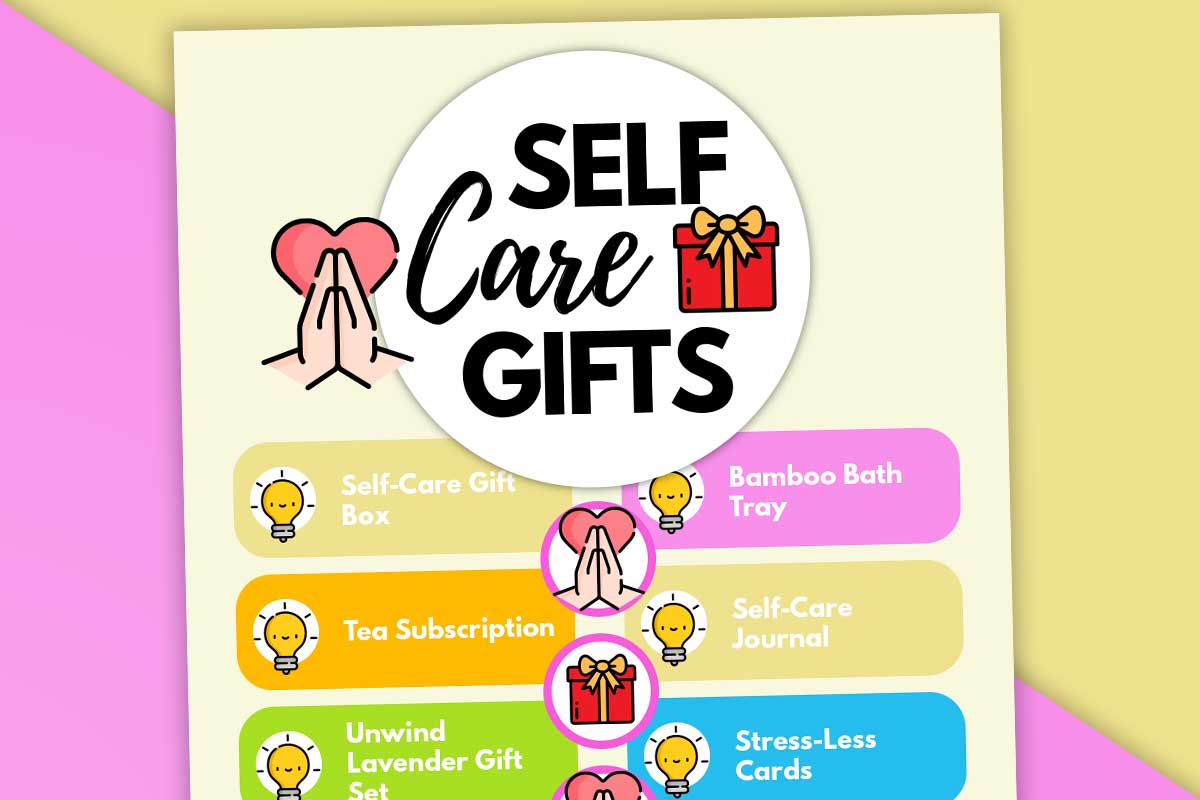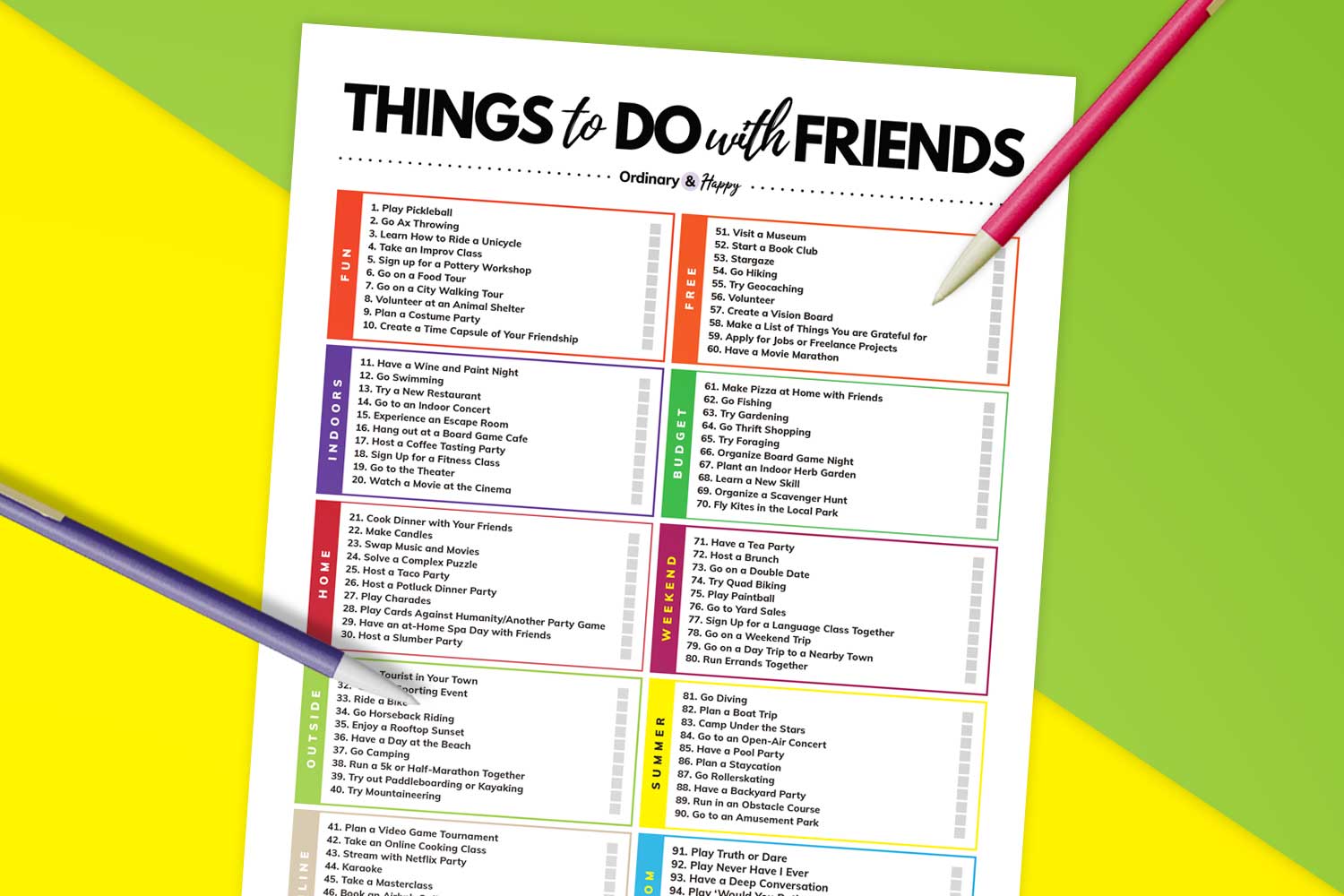How to Break Bad Habits in 10 Smart Ways
This post may contain affiliate links, meaning if you book or buy something through one of these links, I may earn an affiliate commission at no additional cost to you. Learn more
Breaking bad habits is not easy, but these ten smart tips, a detailed plan, and the right frame of mind will help put you on the right path to a healthier and more productive you.

1. Set specific targets
While wanting to ‘quit smoking’ is a good thing, that is far too broad and undefined as a goal.
It can feel overwhelming to break a habit if you don’t have numbers or small goals to aim for.
Rather than saying ‘I want to quit smoking’, break it down into manageable targets. First, say ‘I want to go from 20 to 10 cigarettes a day in a month.’
This is a much easier target to aim for. It gives you numbers to work with. It can be measured.
Once you reach that goal, you can then set ’10 to 5′, ‘5 to 1’ and so on.
2. Identify your triggers
To quit a bad habit, you need to know what causes it in the first place. For example, some people overeat when they’re sad, and others overeat when they’re angry.
Identify your triggers before you start trying to break the habit. To do this, start by carrying a pencil and paper with you and jotting down when you have the bad habit and the circumstances leading up to it. Write down as much as possible.
You’ll quickly notice patterns. Certain times, environments, and situations will cause the bad habit. These are your triggers.
Once you know the triggers, you can take steps to avoid them.
3. Make a plan to break the habit slowly every day
Your plan is your map to success. This is a set of rules you need to follow on a daily basis to slowly break the habit.
Your targets need to be small, and something you can achieve every day.
If you’re trying to lose weight, don’t set a target of going to the gym for 2 hours every day. It’s too much.
Instead, aim for 10-20 minutes of home exercise. Once you reach that, then slowly increase the numbers.
Your plan should also include a calendar. Use it to track how you did every day. Make sure you journal everything, from numbers to feelings.
4. Reward yourself for reaching small targets
Reinforcing good behaviour is a great way to stick to your plan. Knowing there is a reward for your hard work will help keep you motivated.
But be careful of the reward you set. If you want to lose weight, don’t reward yourself with cake after a week of eating healthy.
Instead, think of other things that bring joy to your life. For example, reward yourself with a home spa day instead.
5. Put penalties in place in case you return to the habit
Penalizing yourself can be effective as well. But don’t make the penalty too harsh.
The ‘swear jar’ technique is great to use here. Every time you swear, put a dollar in the jar.
The dollar is a penalty, but it’s not too harsh. If you had to put a hundred dollars in every time you swore, that would make you anxious and stressed.
Think of a penalty like this. Think of something that will keep you motivated but that isn’t too harsh.
6. If you fail, write down how and why it happened
Identifying the trigger or moment that caused you to return to the habit is vital for stopping it from happening again.
Maybe a stressful day at work caused you to start biting your nails again. Or a visit to a cafe caused you to smell smoke and made you crave a cigarette.
Write down as much as you can about your feelings and environment. Something triggered your relapse, and you need to know what it was.
Once you know what it was, you can think about steps to get back on track. Be honest with yourself.
Don’t lose hope if you relapse. Breaking bad habits is a long journey of ups and downs.
7. Change the environment around you to make it easier
Removing triggers from your environment is a huge part of breaking your bad habits.
The old saying of ‘alcoholics shouldn’t have alcohol in the house’ rings true. Make sure your home and safe havens don’t contain your triggers.
You want to lose weight, but every morning you get a high-calorie coffee from Starbucks. Instead, take another route to work. Or buy fresh coffee at home. That way, you can make your own coffee before work.
You need to create an environment that is positive, optimistic, and doesn’t contain your triggers.
This includes many things. People, food, and routine are a big part of this. Even factors like color and sound can have positive or negative effects on you.
8. Document your journey and share it with others
We’ve all seen amazing stories online of weight-loss journeys. And you’ll quickly notice they documented it every day.
Social media can play a big role in helping you break your habits. By sharing your journey every day, you’re holding yourself accountable.
The support from your online friends can also be a big motivator. In those tough times, you won’t want to let them down.
Video journaling is an excellent way to track your progress. When you can see your weight loss or healthier skin, it spurs you on to keep going.
9. Visualize your end goal and think about it when you feel tempted
‘Quit smoking’ or ‘lose weight’ are great goals, but breaking bad habits is not the reason why you’re doing this. There’s a far more meaningful reason.
Knowing this and visualizing it is key to your success. Often, we don’t just want to ‘lose weight’.
We may want to lose weight to ‘look more attractive’, or ‘feel more confident.’ Those are the real reasons we want to break a bad habit.
For some, the end goal can be very emotional. Like ‘living longer after a health scare so I can spend more time with my grandchildren.’
But it’s important to be honest with yourself. That end goal has to be motivating enough to stop yourself when you feel tempted.
10. Don’t look too far ahead and take it day-by-day
When we see ‘before and after’ stories, we only see the finish point. We don’t see all the difficult times it took to get there.
Going in with the right mindset is key to success. Doing a few workouts and expecting to lose lots of weight will only make you quit straight away.
Breaking bad habits takes time. It can take weeks, months, or even years, depending on how bad the habit is.
Keep an eye on the big picture. But make sure you’re hitting your daily targets. And understand it will take time.
These strategies to break bad habits are not complicated. But they do take time. They require you to do them every day, staying true to your end goals.
Most people will fail several times before they break their bad habits. The key is perseverance.
Success won’t come to you straight away. But it will eventually come. You just have to keep going.
Keep doing the small things on a daily basis, and you can break your bad habits and achieve the goals you want in life.
Eager to break your bad habits in the coming weeks and months? Keep this article in a safe place by saving it to one of your self-care Pinterest boards.







